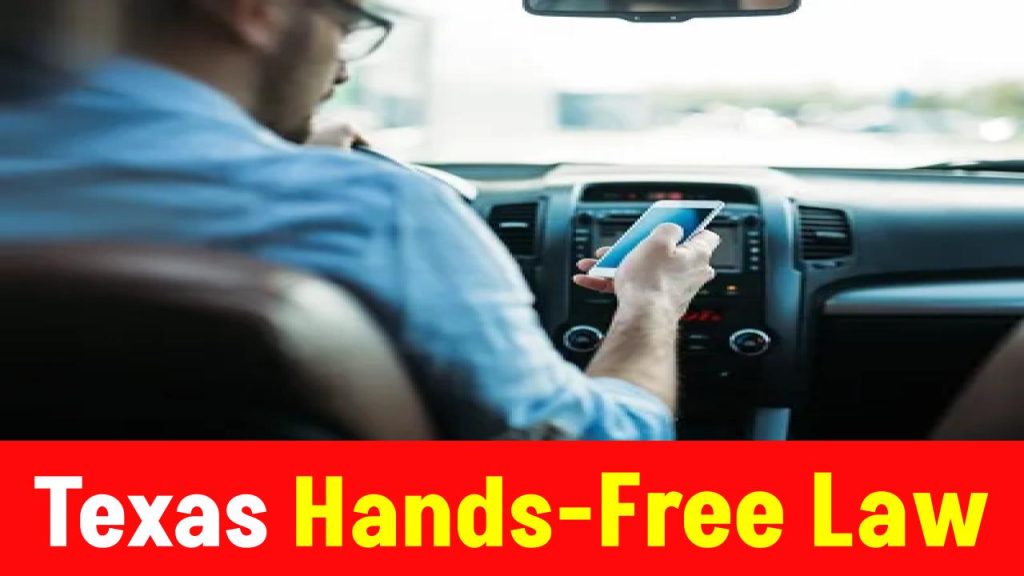
Using a cellphone while driving is a common habit, but in Texas, it can cost you—both in fines and safety risks. Texas’ hands-free law aims to reduce distracted driving and prevent accidents caused by cellphone use behind the wheel. If you’re caught texting or using a handheld device while driving, you could face penalties. But what exactly are the rules? Who does the law apply to? And what exceptions exist?
This comprehensive guide breaks down Texas’ hands-free law, covering fines, penalties, specific restrictions, and local regulations you should know before hitting the road.
What Are the Rules?
| Aspect | Details |
|---|---|
| Statewide Texting Ban | Texting while driving is illegal for all drivers in Texas. |
| Fines & Penalties | First offense: Up to $99; Subsequent offenses: Up to $200 |
| Under-18 Drivers | Cannot use any handheld or hands-free device while driving. |
| Learner’s Permit Holders | Banned from using cellphones during their first six months of driving. |
| School Zones | No handheld device use while driving in active school zones. |
| School Bus Drivers | Cannot use cellphones while transporting children. |
| Local Ordinances | Some Texas cities have stricter laws banning all cellphone use. |
| Emergency Exceptions | Calling 911, police, or medical services is allowed. |
| Official Source | Texas Department of Transportation |
Texas’ hands-free law is designed to make roads safer by reducing distracted driving. Texting while driving is illegal statewide, and specific restrictions apply to young drivers, school zones, and school bus drivers. While Texas does not have a full ban on handheld devices, some cities enforce stricter rules.
To stay compliant, use hands-free technology, avoid texting, and check local laws before driving. Not only will this help avoid fines and penalties, but it will also keep you and others on the road safe.
Also Check: Maximize Your Savings: 2025’s Top 10 Income Tax Credits and Deductions
What Are the Rules? Texas’ Hands-Free Law: What You Need to Know
What is the Hands-Free Law in Texas?
Texas passed House Bill 62 in 2017, making texting while driving illegal statewide. However, unlike some states that prohibit all handheld cellphone use, Texas law only restricts certain uses.
This means:
- You CAN use your phone for navigation (GPS), playing music, and hands-free calls.
- You CANNOT send or receive text messages, emails, or use social media while driving.
What Are the Penalties for Violating Texas’ Hands-Free Law?
If you’re caught using your phone illegally, here’s what you could face:
- First offense: A fine up to $99.
- Second and subsequent offenses: Fines up to $200.
- If texting leads to an accident resulting in serious injury or death: You could be charged with a Class A misdemeanor, leading to fines up to $4,000 and jail time up to one year.
Tip: If you must use your phone while driving, use hands-free technology like Bluetooth or voice commands.
What Are the Rules? Who is Restricted Under Texas’ Hands-Free Law?
While the texting ban applies to all drivers, certain groups face stricter restrictions.
Drivers Under 18
- Cannot use any handheld or hands-free device while driving.
- Even voice-activated calls (like Siri or Google Assistant) are not allowed.
- Violating this law can lead to license suspension.
Learner’s Permit Holders
- If you’ve had a learner’s permit for less than six months, you cannot use a cellphone while driving.
- This rule is meant to help new drivers build good driving habits before adding distractions.
School Zones
- Using any handheld device while driving in an active school zone is illegal.
- Even GPS use is restricted unless it’s completely hands-free.
School Bus Drivers
- If a school bus has children onboard, the driver cannot use a cellphone at all.
Emergency Exceptions
There are some exceptions to Texas’ hands-free law:
- Calling 911 or emergency services (police, fire department, ambulance).
- Reporting a crime or hazard.
- Using a GPS navigation app (as long as you don’t manually input an address while driving).
Also Check: Avoid Long Waits: Use IRS Online Tools for Immediate Support
What Are the Rules? Some Texas Cities Have Stricter Laws
Texas’ hands-free law sets minimum restrictions, but some cities have passed stricter ordinances. In places like Austin, San Antonio, and El Paso, you cannot use a handheld cellphone at all while driving—including talking, texting, or even holding your phone.
Texas Cities with Stricter Laws
| City | Cellphone Use Restrictions |
|---|---|
| Austin | No handheld cellphone use at all. |
| San Antonio | Complete ban on handheld cellphone use. |
| El Paso | No use of handheld devices while driving. |
| Denton | Strict hands-free ordinance in place. |
Tip: Always check local laws before driving in a new city to avoid unexpected fines.
What Are the Rules? How to Avoid Distracted Driving in Texas
To stay compliant and avoid tickets, consider these hands-free driving tips:
Use Hands-Free Technology
- Enable voice commands on your phone (Siri, Google Assistant).
- Use Bluetooth headsets or in-car speakers for calls.
- Mount your phone on a dashboard holder for navigation.
Avoid Manual Inputs
- Set your GPS destination before you start driving.
- Use pre-saved playlists or voice-controlled music apps.
Activate “Do Not Disturb While Driving”
- Many smartphones have a driving mode that silences notifications.
- This prevents you from being tempted to check texts while driving.
Also Check: Tax Time Guide 2025: Key Documents and Tips for Your 2024 Return
What Are the Rules? (FAQs)
Can I use my phone at a red light in Texas?
Yes, Texas law does not prohibit cellphone use when stopped at a red light. However, in some cities with stricter bans (like Austin or San Antonio), this may be illegal.
Can I use my phone for GPS while driving in Texas?
Yes, you can use GPS navigation, but you should not manually enter an address while driving.
Can I talk on the phone while driving in Texas?
Yes, talking on the phone is allowed, but using a handheld device is restricted in certain areas, like school zones.
Do Uber or Lyft drivers have to follow this law?
Yes, all drivers—including rideshare drivers—must follow Texas’ hands-free law.









